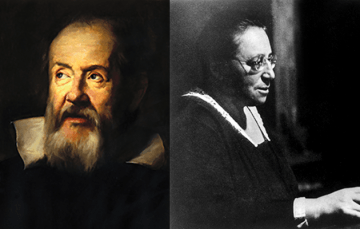Marcus Chown in Prospect:

Galileo was one of the first to realise a profound truth about the Universe: mathematics expresses perfectly the behaviour of the physical world. “Philosophy is written in the grand book (I mean the Universe) which stands continually open to our gaze,” he wrote. “But it cannot be understood unless one first learns to comprehend the language and interpret the characters in which it is written. This book is written in the language of mathematics, and its characters are triangles, circles and other geometrical figures, without which it is humanly impossible to understand a single word of it.”
Since the 17th century, mathematics has time and time again demonstrated that Galileo was right—it is indeed the unique language of the Universe. Among its spectacular successes have been the predictions of the existence of radio waves, black holes, antimatter, the Higgs boson and gravitational waves. In 1960, the Austrian physicist Eugene Wigner articulated what many had been thinking since the time of Galileo when he remarked on “the unreasonable effectiveness of mathematics in the natural sciences.”
So why is mathematics so effective in distilling the essence of the world?
More here.
